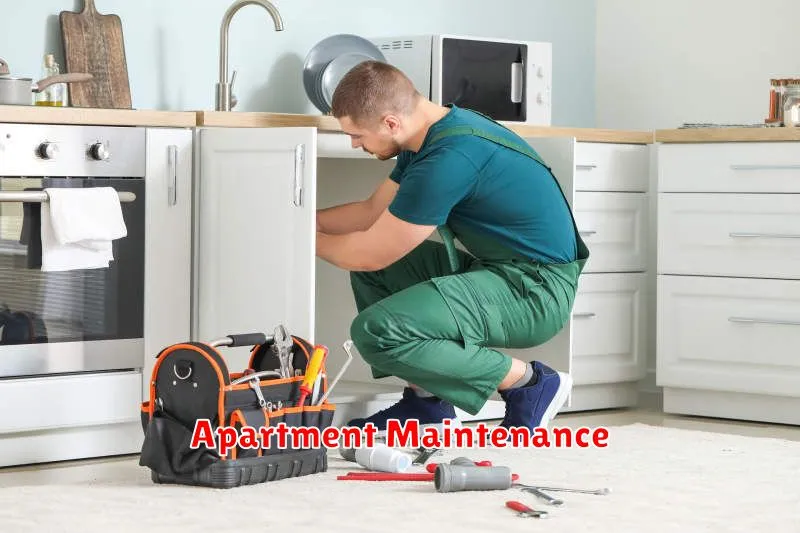Moving into a new apartment can be exciting, but it’s also important to remember that you’re responsible for its upkeep. As a renter, you want to make sure you’re taking care of your space and avoiding any costly repairs. That’s where apartment maintenance comes in. Whether you’re a seasoned renter or just starting out, mastering these essential tips will help you keep your apartment in tip-top shape, ensure a smooth living experience, and potentially save you money in the long run. Ready to become a pro at apartment maintenance? Let’s dive in!
Regular Cleaning and Upkeep
Keeping your apartment clean and well-maintained is crucial for a comfortable and enjoyable living experience. Regular cleaning and upkeep not only prevent dirt and grime buildup but also help maintain the overall condition of your rental property. This can contribute to a more pleasant living environment for yourself and potentially minimize any potential deductions from your security deposit when you move out.
Cleaning should be a regular part of your routine. This includes sweeping or vacuuming floors, wiping down surfaces, cleaning the kitchen and bathroom, and taking out the trash. These simple tasks can make a big difference in keeping your apartment clean and hygienic.
Upkeep includes tasks that go beyond regular cleaning, such as fixing minor repairs, ensuring proper ventilation, and checking for signs of wear and tear. For instance, if you notice a leaky faucet, a broken window, or a faulty appliance, report it to your landlord immediately. It’s important to address these issues promptly to prevent them from escalating into bigger problems. By proactively addressing these issues, you can avoid potential deductions from your security deposit and maintain a comfortable living space.
Preventing Pest Infestations
Living in an apartment doesn’t mean you’re immune to pest problems. To prevent infestations, it’s crucial to maintain a clean and sanitary environment. Regular cleaning is key, especially in the kitchen and bathroom. Ensure you promptly clean up any spills and crumbs, and empty trash regularly. Keep food stored in airtight containers and consider using natural pest deterrents like peppermint oil or lavender. Avoid leaving food out on counters or in open containers, and ensure all dishes are washed and put away promptly.
Pay attention to potential entry points for pests. Seal cracks and holes in walls, around pipes, and under doors. Check window and door screens for tears and make sure they fit snugly. Regularly inspect the exterior of your apartment for signs of pest activity, such as droppings or nests. If you see any evidence of pests, contact your landlord or property management immediately.
Maintaining Appliances
Keeping your apartment appliances in tip-top shape is crucial for a comfortable and hassle-free living experience. Here are some essential tips for maintaining your appliances:
Refrigerator
- Clean the coils: Dust and dirt build-up on the coils can reduce efficiency. Clean them regularly with a vacuum cleaner brush.
- Check the door seals: Ensure the door seals are tight to prevent cold air from escaping. If they’re cracked or damaged, contact your landlord.
- Keep it organized: Avoid overcrowding the refrigerator. This allows for better air circulation and prevents food from spoiling quickly.
Dishwasher
- Run a cycle with vinegar: Periodically, run a cycle with a cup of white vinegar to clean the interior and eliminate odor.
- Clear the filter: Regularly check and clean the filter to prevent clogs.
- Use the correct detergent: Using too much or too little detergent can affect cleaning effectiveness.
Washing Machine
- Clean the drum: Wipe down the drum after each use to prevent mildew and odor. For deeper cleaning, run a cycle with a washing machine cleaner.
- Check the hoses: Ensure hoses are not leaking or damaged. Replace them if necessary.
- Use appropriate detergent: Follow the manufacturer’s recommendations for detergent and avoid overloading the machine.
Oven
- Clean regularly: After each use, wipe down the interior to prevent grease buildup.
- Use an oven cleaner: For a deep clean, use a commercial oven cleaner or baking soda paste.
- Check the door seal: Ensure the door seal is in good condition to prevent heat loss and ensure proper cooking.
By following these tips, you can ensure your apartment appliances stay in excellent condition and prevent costly repairs.
Plumbing Basics for Renters
Living in an apartment means sharing plumbing with your neighbors. While you may not be responsible for major repairs, understanding basic plumbing can help you prevent minor issues and keep your unit running smoothly.
First, familiarize yourself with your apartment’s plumbing system. Locate the main water shut-off valve, which usually resides in the basement or utility room. Learn how to turn it off in case of emergencies. Identify the drain lines and vent pipes to be aware of potential problems.
Avoid pouring grease, oil, or coffee grounds down the drain, as they can clog pipes. Use a drain strainer to catch hair and other debris. If your toilet overflows, turn off the water supply at the base of the bowl and call your landlord immediately.
Regularly check for leaks. Listen for dripping sounds, look for water stains, and feel around pipes for moisture. A slow leak can waste water and cause damage over time. Report any issues to your landlord promptly.
By understanding these basics, you can help prevent plumbing issues and keep your apartment comfortable and livable. Remember to always communicate with your landlord about any problems or concerns, and they will handle the bigger repairs.
Electrical Safety Tips
Electrical safety is paramount in any living space, especially in apartments. It’s essential to be aware of potential hazards and take steps to prevent accidents. Here are some vital electrical safety tips for renters:
Inspect cords and appliances: Regularly check electrical cords for damage, such as frayed wires, cracks, or loose connections. Replace any damaged cords immediately. Also, inspect appliances for signs of overheating or malfunction. If you notice any issues, unplug the appliance and contact a qualified electrician.
Avoid overloading circuits: Overloading electrical circuits can lead to overheating and fire hazards. Be mindful of the number of appliances and devices plugged into each outlet. Use power strips sparingly, and ensure they are properly rated for the devices you are using.
Don’t tamper with electrical wiring: Attempting to repair or modify electrical wiring yourself is extremely dangerous. Leave it to qualified electricians who are equipped to handle such tasks safely. Never try to fix electrical problems if you are unsure how to do so.
Keep electrical panels clear: The electrical panel should be kept clear of clutter and obstructions. Ensure that the cover is securely closed and that there are no loose wires or exposed components.
Use grounded outlets: Always use grounded outlets whenever possible. Grounded outlets provide a path for electricity to flow safely to the ground in case of a fault, reducing the risk of electric shock.
Unplug appliances when not in use: It’s a good practice to unplug appliances and electronic devices when you’re not using them. This helps to reduce energy consumption and minimize the risk of electrical fires.
Be cautious with water and electricity: Never use electrical appliances near water sources, such as sinks or bathtubs. This is especially important in bathrooms, where the risk of electric shock is higher.
Following these electrical safety tips can help you create a safer and more comfortable living environment in your apartment.
HVAC System Maintenance
Your apartment’s HVAC system is responsible for keeping you comfortable year-round, but it needs regular maintenance to function properly. Neglecting your HVAC system can lead to higher energy bills, uncomfortable temperatures, and even system breakdowns. As a renter, you may not be responsible for major repairs, but there are some simple maintenance tasks you can do to keep your HVAC system running smoothly.
One of the most important things you can do is to change the air filter regularly. A dirty air filter restricts airflow, making your system work harder and less efficiently. You should change the filter every 1-3 months, depending on your usage and the type of filter. You can usually find the filter behind a panel near your HVAC unit.
Another essential maintenance task is to keep the area around your HVAC unit clean. This means clearing away any debris or obstructions that could block airflow. Also, make sure that the vents in your apartment are clear and not blocked by furniture or other objects. This helps ensure efficient air circulation throughout your living space.
If you notice any problems with your HVAC system, such as unusual noises, strange smells, or inconsistent temperatures, be sure to contact your landlord or property manager right away. They will be responsible for addressing any major issues. However, by taking these simple maintenance steps, you can help prevent problems and ensure that your HVAC system operates smoothly and efficiently for years to come.
Proper Waste Disposal
Proper waste disposal is crucial for maintaining a clean and healthy living environment in your apartment. Not only does it prevent unpleasant odors and pests, but it also ensures compliance with your lease agreement and local regulations.
To dispose of waste effectively, follow these simple steps:
- Use designated bins: Separate your trash, recyclables, and compostables into the appropriate bins provided by your landlord.
- Securely seal trash bags: Use strong trash bags and tie them tightly before placing them in the designated bins. This prevents spills and odors.
- Dispose of hazardous waste properly: Items such as batteries, paint, and cleaning chemicals should not be thrown in the regular trash. Check with your local waste management company for disposal instructions or look for designated drop-off locations.
- Keep bins clean: Regularly clean your trash bins to prevent odor build-up and insect infestations.
- Avoid overfilling: Do not overfill your trash bins, as this can attract pests and cause spills.
By following these guidelines, you can ensure proper waste disposal and contribute to a cleaner and more hygienic apartment environment.
Addressing Minor Repairs
While landlords are responsible for major repairs, renters often handle minor repairs. These small fixes keep your apartment in good condition and can save you from bigger problems down the line.
Start by checking your lease. It might outline which repairs you’re responsible for, and you should always contact your landlord before attempting anything that could affect the structure or wiring of the building.
For common issues like leaky faucets, clogged drains, or loose handles, you can usually find solutions online or in DIY guides. Always use caution and safety measures when working with tools or chemicals. If you’re unsure, it’s best to call a professional.
Keeping a small repair kit with basic tools, screws, and sealant can come in handy. This way, you can address minor issues quickly and avoid them escalating into bigger problems.
Remember, addressing minor repairs promptly is crucial for maintaining a comfortable and safe living environment. It also demonstrates your respect for the property and can prevent larger, more costly issues from arising.
Communicating with Your Landlord
Effective communication with your landlord is crucial for a smooth and hassle-free rental experience. It’s important to establish a clear and respectful line of communication from the start. Here are some tips to keep in mind:
Be proactive: Don’t wait for issues to become major problems. If something needs attention, inform your landlord promptly. This shows responsibility and helps prevent bigger problems from developing.
Document everything: Keep records of all communication, including emails, text messages, and phone calls. This will provide evidence of your requests and responses from your landlord.
Use appropriate channels: Understand the preferred method of communication for your landlord. Some landlords prefer email, while others may favor phone calls. Respect their preference and communicate in the designated way.
Be respectful: When addressing your landlord, maintain a professional and courteous tone. Avoid being aggressive or demanding, and focus on the issue at hand.
Understand lease terms: Familiarize yourself with the lease agreement regarding maintenance responsibilities. This will help you understand what issues are your responsibility and what falls under the landlord’s domain.
Request in writing: It’s always a good idea to submit requests for repairs or maintenance in writing, such as through email or a letter. This creates a paper trail and establishes a clear record of your request.
By following these tips, you can ensure open and effective communication with your landlord, leading to a positive rental experience for both parties.
Documenting Maintenance Issues
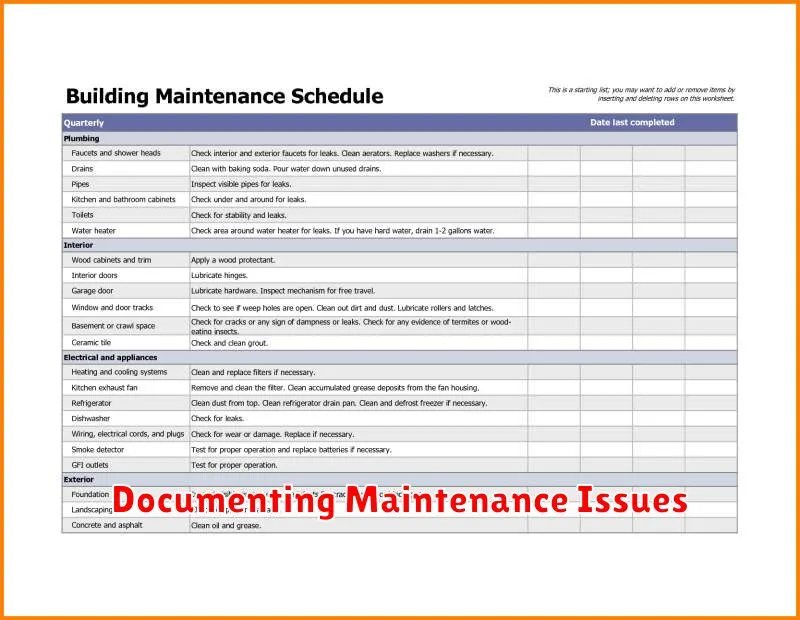
Keeping a record of maintenance issues is crucial for renters. It can help you track repairs, avoid disputes with your landlord, and ensure your security deposit is returned. Here’s how to document maintenance issues effectively:
Date and Time: Always note the exact date and time of the issue. This creates a clear timeline of events.
Detailed Description: Provide a comprehensive description of the issue, including its location in the apartment, severity, and any relevant details like the specific appliance or fixture. Include any relevant details, like the specific appliance or fixture.
Photos and Videos: Visual documentation is invaluable. Take clear pictures and videos of the issue from multiple angles. They serve as objective evidence of the condition.
Communication with Landlord: Keep records of all communications with your landlord, including emails, text messages, and phone calls. Note the date, time, and content of each conversation. You can use this documentation to prove you’ve notified them about the issue.
Maintenance Requests: Use your landlord’s preferred method for submitting maintenance requests. Keep copies of all submitted requests and any responses.
Documentation Format: Maintain your records in a organized manner. A dedicated file, spreadsheet, or notebook can help keep your documentation readily available.
By documenting maintenance issues meticulously, you’re safeguarding your rights as a renter and ensuring a smooth resolution for any maintenance concerns.
Seasonal Maintenance Checklist
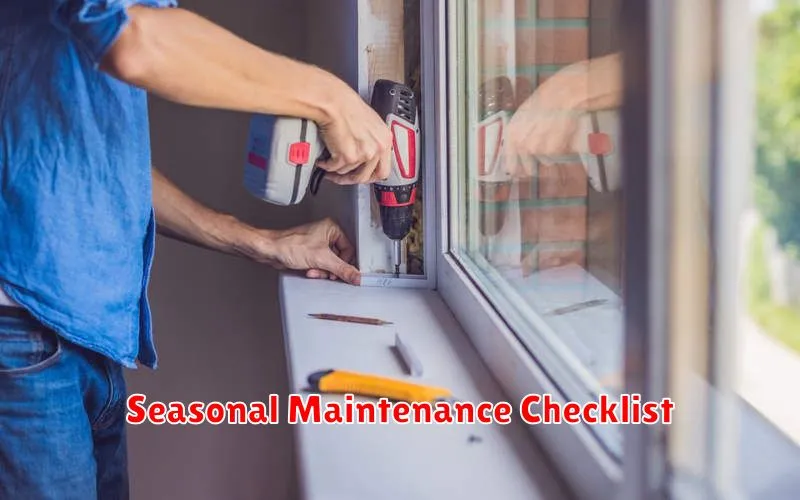
Keeping your apartment in tip-top shape doesn’t have to be a daunting task. By following a simple seasonal maintenance checklist, you can prevent major issues and ensure a comfortable living environment.
Spring is the perfect time to give your apartment a deep clean. This includes:
- Cleaning windows and window sills
- Washing curtains or blinds
- Deep cleaning carpets and upholstery
- Checking for any pest infestations and addressing them promptly
Summer calls for preventative measures to stay cool and comfortable.
- Ensure your AC unit is working properly and clean the filters regularly
- Inspect windows and doors for leaks or drafts
- Check for any signs of water damage, especially after heavy rains
- Consider installing window shades or blinds to reduce heat build-up
Fall is a time for preparing your apartment for the colder months.
- Inspect and clean your heating system to ensure it is functioning properly
- Seal any drafts around windows and doors
- Clean gutters to prevent water damage
- Store away summer items and bring out winter essentials
Winter brings its own unique challenges, so it’s important to take proactive steps to stay warm and safe.
- Keep your heating system running efficiently
- Check for any leaks or water damage, especially in areas like the basement or attic
- Ensure your smoke detectors are functioning properly
- Clear snow and ice from walkways and steps to prevent slip and falls
By following these simple seasonal maintenance tips, you can keep your apartment in good condition, prevent costly repairs, and enjoy a more comfortable living space. Remember, your landlord may have specific rules or guidelines regarding maintenance, so be sure to review your lease agreement for any relevant information.
Handling Emergencies
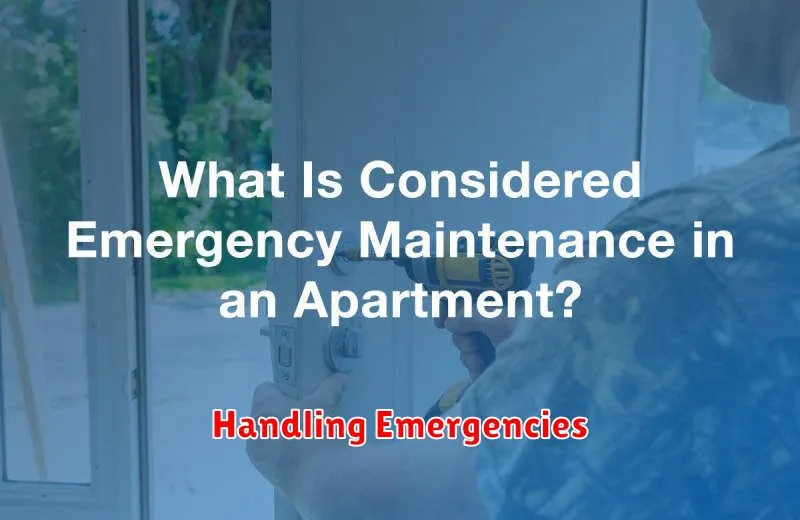
It’s crucial to know how to handle emergencies in your apartment.
First, always familiarize yourself with your lease agreement, particularly the section outlining your responsibilities in case of emergencies.
Keep emergency contact information readily available, including your landlord’s number, local emergency services, and the building management’s contact details.
In case of a fire, evacuate immediately, following the building’s fire safety plan. If possible, close doors behind you to contain the fire. Once outside, stay clear of the building and call emergency services.
For a water leak, turn off the water supply to your apartment if possible, and then contact your landlord or building management immediately.
In case of a power outage, check if it’s a building-wide issue. If it’s not, try to reset your circuit breaker. If that doesn’t work, contact your landlord.
When dealing with any emergency, it’s essential to prioritize safety. Stay calm and follow the appropriate steps. Always inform your landlord or building management as soon as possible, providing details about the situation.
Moving Out Inspection Preparation
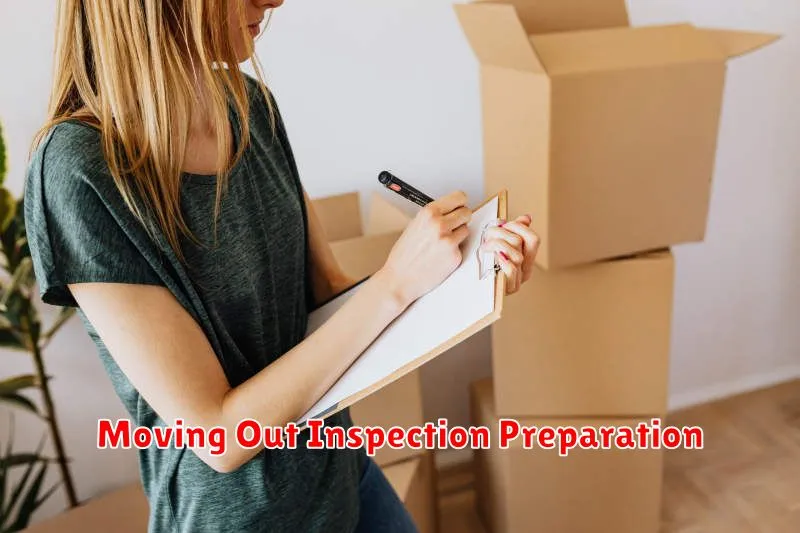
When it comes to moving out of an apartment, the inspection is a crucial step. It determines whether you receive your full security deposit back. To avoid deductions, thorough preparation is key. Here are some tips to ensure a smooth and successful moving-out inspection:
Deep Clean: Start by giving your apartment a thorough cleaning. This includes scrubbing floors, wiping down walls and counters, cleaning appliances, and decluttering. Don’t forget to clean windows, blinds, and light fixtures. Make sure to use a good disinfectant to kill bacteria and germs.
Check for Damages: Carefully inspect the entire apartment for any damages, even minor ones. This includes walls, floors, appliances, fixtures, and windows. Document any pre-existing damage with photos or videos and inform your landlord in writing.
Repair Any Damages: If you notice any damages that are your responsibility, make sure to fix them before the inspection. Contact your landlord to inquire about the process for repairing damage and follow their instructions.
Return Items: If you have borrowed any items from your landlord, like a spare key or a parking pass, return them to the landlord well in advance of the inspection.
Check Lease Agreement: Review your lease agreement carefully. It will specify any specific instructions for moving out, such as whether you need to paint the apartment or remove any personal belongings.
Schedule Inspection in Advance: Contact your landlord to schedule the inspection at least a week before your move-out date. This will allow enough time to address any issues and ensure a smooth inspection.
Be Present During the Inspection: It is crucial to be present during the inspection to ensure everything is noted and understood. This allows you to point out any pre-existing damage and clear any misconceptions.
By taking these steps, you can increase your chances of getting your full security deposit back and ensuring a smooth move-out experience.

